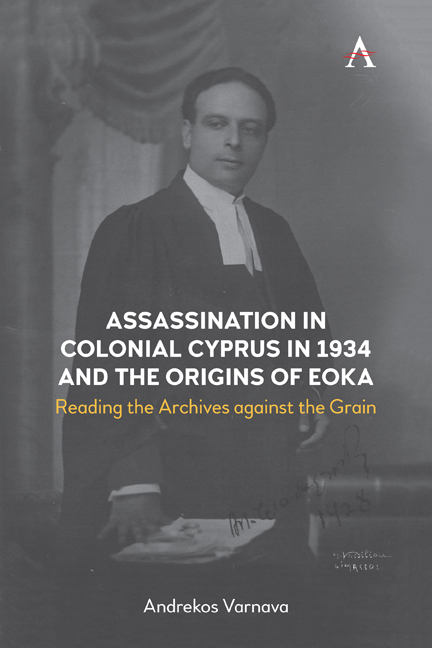 Assassination in Colonial Cyprus in 1934 and the Origins of EOKA
Assassination in Colonial Cyprus in 1934 and the Origins of EOKA Book contents
- Frontmatter
- Dedication
- Contents
- List of Figures
- Acknowledgements
- List of Abbreviations
- Note on Translations
- Introduction
- 1 Triantafyllides before his Assassination
- 2 The Colonial Newspaper Archive and the Triantafyllides Case
- 3 The Colonial Government Archive and the Triantafyllides Case
- 4 The Assassination of Triantafyllides and the EOKA Connection
- Conclusion
- Select Bibliography
- Index
4 - The Assassination of Triantafyllides and the EOKA Connection
Published online by Cambridge University Press: 22 February 2022
- Frontmatter
- Dedication
- Contents
- List of Figures
- Acknowledgements
- List of Abbreviations
- Note on Translations
- Introduction
- 1 Triantafyllides before his Assassination
- 2 The Colonial Newspaper Archive and the Triantafyllides Case
- 3 The Colonial Government Archive and the Triantafyllides Case
- 4 The Assassination of Triantafyllides and the EOKA Connection
- Conclusion
- Select Bibliography
- Index
Summary
One very important point which should not be forgotten is that a very large number of sound-minded Greeks (i.e. Greek Cypriots), not belonging to any of the two parties (AKEL or KEK), find it extremely difficult to speak publicly and express their views openly on this subject (enosis), for the simple reason that they would be running the risk of being accused as traitors by the others who appear to be the real enemies of this country.
Anonymous Greek Cypriot to Sir Cosmo Parkinson, 1 September 1944.You may think there is nobody alive to recall the assassination of Antonios Triantafyllides. Well you would be wrong. Antonis Pitrakkou, a grand old man and my wife's uncle by marriage, remembers it well. Uncle Antonis is a great storyteller. One day I was telling him about my research on the assassination of Triantafyllides. At length he stopped me and asked: ‘Although I’m from Rizokarpasso, you know I was born in Aglanja?’ I said: ‘yes I know’. He then leaned forward and recounted:
I remember the assassination of Antonakis Triantafyllides well. I was about eight and it was not long after that we moved to my parent's village of Rizokarpasso. I remember my father coming home in the evening (13 January) and saying sadly: “they’ve killed Triantafyllides, our best one”. Even as young as 8, I understood and sensed the sadness and shock. How could I forget.
We were both astonished and it is amazing that a migrant to Adelaide, Australia, in 1948, and now 94, could recall, yet, as he said: ‘how could I forget’. The fear and shock in the Greek Cypriot community were palpable. And the comment ‘our best one’, shows that uncle Antonis's father, an ordinary worker, considered Triantafyllides the best politician going around.
The way the past is remembered and forgotten are integral to forming state-controlled national histories and identities. The degree of state control depends on the character of the state and the level of nation-building that elites perceive is necessary. The control is greatest in postcolonial societies that maintain the rage against the colonial authority and in divided societies – Cyprus is both. I have previously shown how one of the largest enlistments in the British forces during the Great War, the Cypriot Mule Corps, was silenced from Cypriot historical consciousness and historiography.
- Type
- Chapter
- Information
- Assassination in Colonial Cyprus in 1934 and the Origins of EOKAReading the Archives against the Grain, pp. 85 - 102Publisher: Anthem PressPrint publication year: 2021


